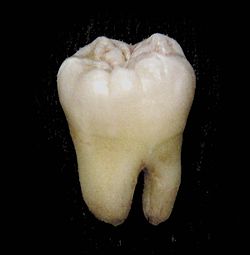djente
Appearance
Ladino
[edit]Alternative forms
[edit]Etymology
[edit]Inherited from Old Spanish yente, from Latin gens, gentis. Compare Spanish gente.
Pronunciation
[edit]Audio (Türkiye): (file)
Noun
[edit]djente f (Hebrew spelling ג׳ינטי)[1]
- people (folk) [16th c.]
- 2013 November 30, Jacobo Sefamí, Miriam Moscona, Por mi boka: Textos de la diáspora sefardí en ladino[2], Penguin Random House Grupo Editorial México, →ISBN, page 66:
- I el sol es de dos modos kontrarios uno de otro, ke la parte ke esta para la tierra es de fuego, ma la otra parte ke da para el sielo es de pedrisko, ke kon esto se konserva uno kon otro, i el envierno tiene la vanda del pedrisko para la tierra i ansi aze muncho friyo, i si no fuera ke la otra vanda es de fuego, no era posivle ke pudieran la djente sonportarlo.
- And the sun is of two phases contrary to one another: the part for the earth is fire, yet the other part for the sky is hail, one with the other is kept with this, and winter has hail's side for the earth, making it very cold, and if it weren't for the other side, the fiery one, it would not be possible that people could bear it.
References
[edit]Papiamentu
[edit]
Etymology
[edit]Derived from Spanish diente and Portuguese dente and Kabuverdianu denti.
Noun
[edit]djente
Categories:
- Ladino terms inherited from Old Spanish
- Ladino terms derived from Old Spanish
- Ladino terms inherited from Latin
- Ladino terms derived from Latin
- Ladino terms with audio pronunciation
- Ladino lemmas
- Ladino nouns
- Ladino nouns in Latin script
- Ladino feminine nouns
- Ladino terms with quotations
- Papiamentu terms derived from Spanish
- Papiamentu terms inherited from Portuguese
- Papiamentu terms derived from Portuguese
- Papiamentu terms derived from Kabuverdianu
- Papiamentu lemmas
- Papiamentu nouns
- pap:Anatomy
- Papiamentu terms with quotations
